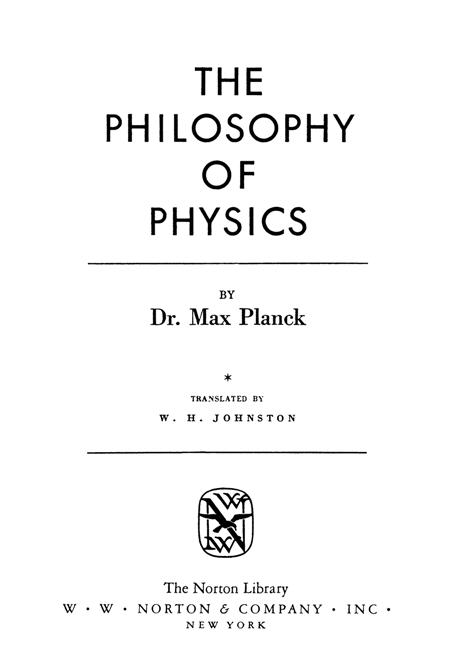Max Planck studied at the Universities of Munich and Berlin, taught first at Kiel and then at Berlin. He devoted himself to the study of theoretical physics in particular, thermodynamics. He gained international fame with The Law of Radiation (1901) in which he asserted that the energy of radiation is emitted and absorbed in integral multiples of certain indivisible "quanta; by 1912 Planck had extended the quantum theory to include all kinds of energy, with the further assumption that only emission proceeds discontinuously in quanta, whereas absorption is continuous; this later assumption enabled him to derive the distribution of energy in the spectrum of black-body radiation, and laid the foundation for all subsequent development and modification of quantum theory. In 1918 he was awarded the Nobel Prize for physics.
THE
PHILOSOPHY
OF
PHYSICS
BY
Dr. Max Planck
*
TRANSLATED BY
W. H. JOHNSTON
The Norton Library
W W NORTON & COMPANY INC
NEW YORK
Copyright, 1936 , by W. W . Norton & Company , Inc .
First published in the Norton Library 1963
Books That Live
The Norton imprint on a book means that in the publishers
estimation it is a book not for a single season but for the years.
W. W. Norton & Company, Inc.
PRINTED IN THE UNITED STATES OF AMERICA
CONTENTS
III. Scientific Ideas:
Their Origin and Effects
I
PHYSICS AND WORLD PHILOSOPHY
T he subject of this chapter is the connection between physics and the endeavor to attain a general philosophy of the world; and it may well be asked wherein this connection consists. Physics, it may be urged, is solely concerned with the objects and events of inanimate nature, while a general philosophy, if it is to be at all satisfactory, must embrace the whole of physical and intellectual life and must deal with questions of the soul, including the highest problems of ethics.
At first sight this objection may seem convincing. Yet it will not bear closer investigation. In the first place inanimate nature is, after all, part of the world, so that any philosophy of the world claiming [Page 9] to be truly comprehensive must take notice of the laws of inanimate nature; and in the long run such a philosophy becomes untenable if it conflicts with inanimate nature. I need not here refer to the considerable number of religious dogmas to which physical science has dealt a fatal blow.
The influence of physics upon a general world philosophy is not, however, confined to such a negative or merely destructive activity; its contribution in a positive sense is of much greater importance. This is true with regard both to form and to content. It is common knowledge that the methods of physical science have proved so fruitful largely on account of their exactness and have on this account provided a model for not strictly scientific studies; while in regard to content it should be said that every science has its roots in life and that similarly physics can never be completely separated from its student; every student, after all, is a personality equipped with a set of intellectual and ethical properties. Hence the general philosophy of the student will always have some influence on his scientific work, while conversely the results of his studies cannot but exert some influence on his general philosophy. It will be the chief purpose of the present chapter to demonstrate this in detail with respect to physics. [Page 10]
I propose to begin with a general consideration. Any scientific treatment of a given material demands the introduction of a certain order into the material dealt with: the introduction of order and of comparison is essential if the available and steadily increasing matter is to be grasped; and the obtaining of such a grasp is essential if the problems are to be formulated and pursued. Order, however, demands classification; and to this extent any given science is faced by the problem of classifying the available material according to some principle. The question then arises, what is to be this principle? Its discovery is not only the first but, as ample experience proves, frequently the decisive step in the development of any given science.
It is important at this point to state that there is no one definite principle available a priori and enabling a classification suitable for every purpose to be made. This applies equally to every science. Hence it is impossible in this connection to assert that any science possesses a structure evolving from its own nature inevitably and apart from any arbitrary presupposition. It is important that this fact should be clearly grasped; it is of a fundamental significance because it demonstrates that it is essential, if there is to be any scientific knowledge, to determine the principle in accordance with which [Page 11] its studies are to be pursued. This determination cannot be made merely in accordance with practical considerations; questions of value also play their part.
Let us take a simple example from the most mature and exact of all sciences, mathematics. Mathematics deals with the magnitude of numbers. In order to obtain a survey of all numbers the obvious method would be to classify them by magnitude; in which case any two numbers are close to each other in proportion as the difference between them is small. Let us take two numbers which are practically equal in magnitude, one of them being the square root of 2 and the other 1.41421356237. The former figure is a few billionths greater than the latter and in every numerical calculation in physics or in astronomy the two numbers can be treated as completely identical. So soon, however, as numbers are classified in accordance with their origin, and not in accordance with their magnitude, a fundamental difference between the two numbers arises. The decimal fraction is a rational number and can be expressed by the ratio between two integers, while the square root is irrational and cannot be so expressed. If now it is asked whether these two numbers are closely related to each other or not, then any dispute on this question formu- [Page 12] lated in this manner would have no more meaning than a dispute between two persons facing each other and debating which side was right and which left.
I have taken this simple example because I am convinced that many scientific controversies, and among them many which aroused a maximum of bitterness, have ultimately been due to the fact that the two opponents were, without clearly stating it, employing different principles of classification in the arrangement of their arguments. Every kind of classification is inevitably vitiated by a certain element of caprice and hence of onesidedness. The selection of the principle of classification is even more important in the natural sciences. As an example one might take botany. Some kind of nomenclature is essential and hence all plants must be divided according to species, genera, families, etc. But according as different principles of classification were selected, so different systems evolved. In the history of botany there have sometimes been sharp controversies between these systems, none of which can claim infallibility since each is affected by subjective bias. The natural system of plants now in general use, although superior to the earlier artificial systems, is not definitive nor clearly determined in every detail, but is subject to certain fluc- [Page 13] tuations corresponding to the different attitudes taken by leading investigators to the question of the most expedient principle of classification.




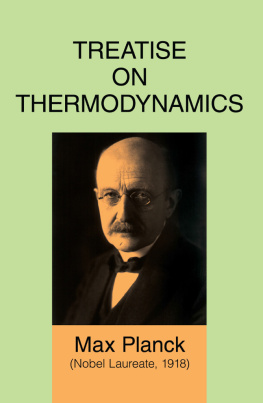
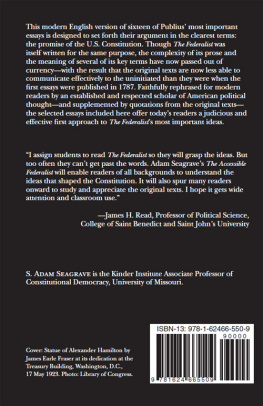

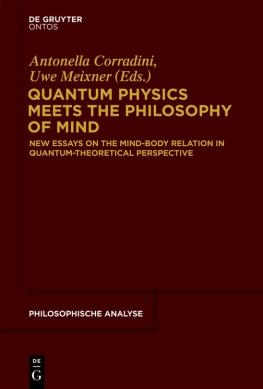

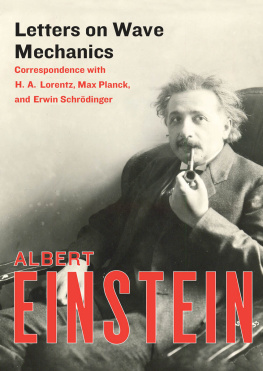
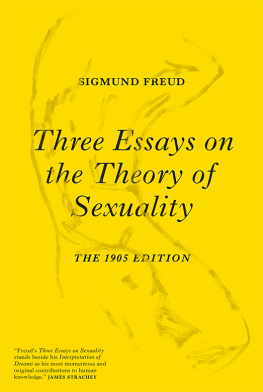
![Jay John - The Federalist : a collection of essays, written in favour of the new Constitution, as agreed upon by the Federal Convention, September 17, 1787. : In two volumes. Vol. I[-II.]](/uploads/posts/book/76130/thumbs/jay-john-the-federalist-a-collection-of-essays.jpg)


